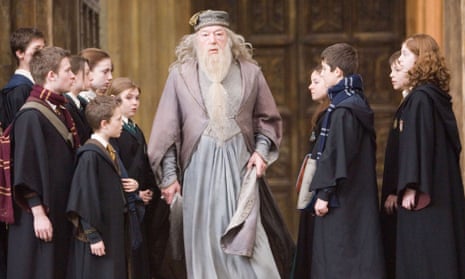When Dumbledore came out of the closet during a JK Rowling Q&A in 2007, the LGBT rights organisation Stonewall said the revelation showed there was “no limit to what gay and lesbian people can do, even being a wizard headmaster”. The audience at New York’s Carnegie Hall responded with enthusiastic applause, and rightly so.
This was a time when the abhorrent myth that same-sex relationships and paedophilia were somehow connected remained fresh in the memory. It was this deeply offensive mode of thinking that fuelled the Thatcher-era Section 28 laws in the UK and still retains currency in Putin’s Russia. By making the headmaster of the story’s wizarding school gay, Rowling instantly cast the real-life equivalent of a Riddikulus charm on such execrable notions.
And yet other prominent commentators wondered whether Rowling’s announcement was a mere token gesture, her seven Harry Potter novels having already hit the bookshelves. “I am disappointed that she did not make Dumbledore’s sexuality explicit in the [final] Harry Potter book,” said campaigner Peter Tatchell. “Making it obvious would have sent a much more powerful message of understanding and acceptance.”
Rowling clearly meant well, but Tatchell and his peers may have missed an even more unfortunate issue with the ancient sorcerer’s belated outing. The author revealed at the same Q&A that Dumbledore fell in love with the dark wizard Grindelwald – played by Johnny Depp in Fantastic Beasts and Where to Find Them – and was “horribly, terribly let down”, describing the affair as the character’s “great tragedy”.
The problem here is that Dumbledore now falls into another stereotype, that of the elderly, troubled gay man who dies alone and unloved. Why couldn’t Rowling’s only gay character – as far as we know – have ended his days in happy, married contentment?
The good news is that Rowling now has something of a second chance, for comments from the author and long-term Potter producer David Heyman in the last week have made it clear that the future Hogwarts headmaster is to play a major role in the forthcoming five-film Fantastic Beasts saga. Heyman has even suggested Dumbledore might replace Newt Scamander, the key figure in the critically acclaimed, Rowling-penned debut episode, as the main protagonist in future instalments.
This matters, as campaigners have long called on the rival Star Wars and Marvel Cinematic Universe sagas to introduce major gay characters to help improve Hollywood’s appalling record on diversity. Despite prominent social media efforts, there has been little sign that Chris Evans’s Captain America or John Boyega’s Finn are primed to come out of the closet any time soon, though Gal Gadot’s Wonder Woman, according to some, already is. But Rowling appears ready to break new ground.
So who will get the role? There is a groundswell of online support for Jared Harris, whose father Richard played Dumbledore in Harry Potter and the Philosopher’s Stone and Harry Potter and the Chamber of Secrets. The Mad Men star has even begun to find himself forced to fend off questions about the role in interviews, telling the Evening Standard: “They’re obviously thinking about it. I haven’t heard anything and I don’t expect to. It’s not up to me.”
Other actors tipped for the role include Ewan McGregor, Daniel Craig, Mark Rylance, Game of Thrones’ Iain Glen, Hugo Weaving and Jude Law. If you’re wondering why all of these are men in their 40s and 50s, it’s because Rowling has already cast 53-year-old Depp as Grindelwald, and told readers (via her Pottermore site) that Dumbledore was born in 1881. According to this timeline, the powerful wizard would have been 45 during the events of Fantastic Beasts (in 1926) and will be 64 in 1945, when the saga reaches its conclusion. Harris, for the record, is 55.
Whoever gets the role, it’s important that Rowling addresses the question of Dumbledore’s sexuality and how the wizarding world sees same-sex relationships. Some might say that no universe in which goblins, elves and giants are real and it’s possible to travel from London to the Yorkshire moors in the whisk of a wand should be panicking about its approach to representing real-world diversity. They might argue that Dumbledore’s sexual preferences should have no bearing on the way he is presented in the new film series. Yet is it possible for a society that spawns coteries of evil such as the Death Eaters, with their Nazi-like attitudes towards non-wizards, to be blind to other forms of prejudice? Fantastic Beasts has already faced criticism from some quarters for making the president of the US’s wizarding community a black woman (British actor Carmen Ejogo) but failing to address how such developments are possible in 1926, a period in which many African-American people were disenfranchised.
Viewed through such a prism, it would beggar belief if the Hogwarts headmaster’s sexuality was quietly swept under the carpet in Rowling’s screenplays for the next four movies. Not least because we fans have so many questions of him. Did Dumbledore’s early relationship with Grindelwald really cause him to swear off sex for the final 70 or 80 years of his life, like some wizarding take on famous celibate Andy Warhol?
That seems to reinforce stereotypes, rather than destroy them, which is presumably the last thing Rowling wanted to do.

Comments (…)
Sign in or create your Guardian account to join the discussion